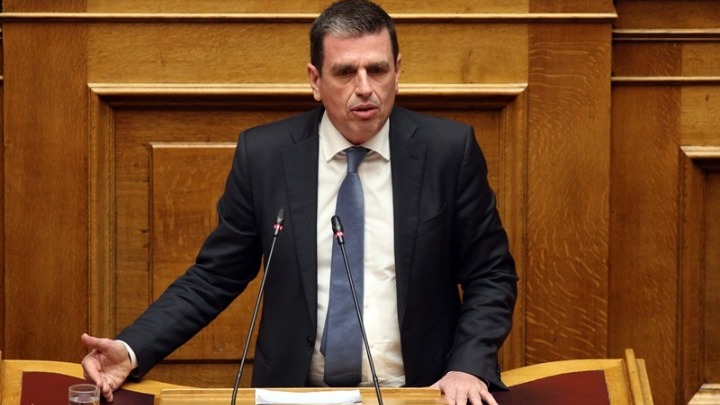The regulation the government tabled, under discussion in the plenary now, “does not legalize migrants, or grant them the right to permanent residence and citizenship,” Migration and Asylum Minister Dimitris Kairidis insisted in parliament on Monday, defending an amendment to address a shortage of labor.
The amendment was tabled in a Labor Ministry omnibill on insurance on Friday.
“It is a restricted initiative, but planned and very carefully prepared, that potentially relates to nearly 30,000 beneficiaries. It does not resolve the issue of a shortage of workers but is a first positive step toward a comprehensive strategy we have at the Migration and Asylum Ministry,” Kairidis added.
The amendment tabled on Friday foresees granting a three-year stay and work permits to migrants who entered Greece illegally. It concerns some 30,000 undocumented migrants from non-EU countries still living in Greece who have been working, albeit irregularly, for a minimum of three years.
The permit’s beneficiaries, the draft law says, must fulfill certain conditions: have a job offer from an employer in Greece for temporary work; have resided in Greece for at least three consecutive years, without a residence permit, by November 30, 2023; and continue to reside in Greece past the November date. The deadline for applying for this permit has been set to December 31, 2024.
Kairidis insisted that the government “is against illegal status, and for a legal one,” and was fighting human traffickers, but at the same time, he said, “we want to facilitate legal migration routes within reason, under terms and rules, in tandem with the Greek economy’s needs.”
The minister acknowledged that there is widespread suspicion in Greek society over the issue of legalizing migrants because of its experiences in 2015-2017. He added that “we are not doing something Europe is not doing. On the contrary, we are following very cautiously what Europe does, especially Italy, to which we are losing a great number of laborers recently, because it is a lot easier for them to get official papers there.” The draft proposal will not turn Greece into a magnet for illegal migration, he underlined, because the regulation does not relate to new arrivals but those who have been in the country earlier than 2022.
The 30,000
“The great majority leave Greece either as refugees or as undocumented migrants, and end up in the affluent north, in Germany,” he said, adding that those to take advantage of the amendment include “those who came legally to Greece, worked legally, and for some reason did not renew their residence permits in Greece – Albanians, Georgians, household helpers from the Philippines or elsewhere.” For these, Greece is “now granting them an opportunity to leave the illegal status and undeclared work, undocumented and unidentified (work), and at the same time to bring revenues to the public coffers and insurance funds, and to fight the unfair competition created by undeclared work.”
The amendment has been rigorously debated in parliament by several opposition parties as an attempt to legalize all migrants arriving in Greece without papers, and calling for more comprehensive laws. Criticism also came from the ruling New Democracy as well, with Deputy Stratos Simopoulos (Thessaloniki) saying he would vote for it, but requesting “that the government not bring such important amendments without substantial discussion.”
He added that the problem of seasonal workers was “stupendous, even in the industry sector. How does the government resolve this? By legalizing migrants who entered Greece illegally.”
New article on Tuesday
Another article that will be tabled in parliament’s plenary on Tuesday foresees the one-year extension of certain work permits for non-EU laborers, especially farm laborers. Under this article, employers who have hired workers that did not need a visa to work in Greece, may file for the one-year extension of the work period. The request must be submitted by December 31, 2024.










